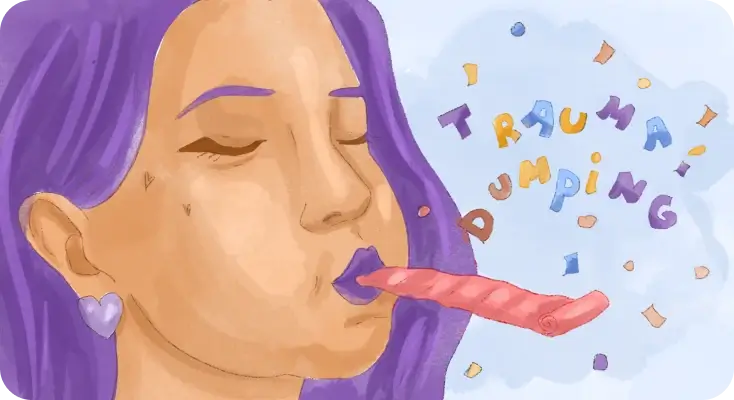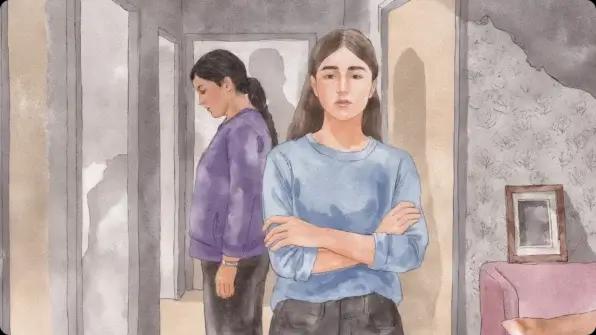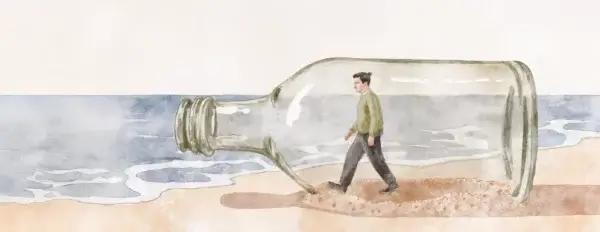- “Trauma dumping” means oversharing traumatic experiences even when it’s not the right time, the right person, or the right context.
- Venting differs from trauma dumping in that two people share their hardships and support each other.
- Trauma dumping might cause problems in a relationship or friendship. It can push people away if you regularly make them uncomfortable about conversations with you.
What is trauma dumping?
Trauma dumping is a situation in which someone unloads painful stories or tough emotions onto others, even if others are not ready or do not consent to hearing them. This often happens at the wrong moment and without thinking about how it affects everyone around. “Trauma dumping” isn’t a medical definition but rather a term colloquially used.
Is trauma dumping bad?
There’s nothing wrong with sharing your emotions and getting support. However, the place, time, and person you talk to play crucial roles.
Being vulnerable to a close friend who’s always ready to become a shoulder to lean on is completely OK. But telling the same story to a coworker over lunch might be a bit off-putting.
Here’s an insight from a Reddit user: “It is part of our responsibility (as trauma survivors) to learn to notice or check in with others before sharing. That doesn’t mean that it’s wrong to share about your trauma… But it’s important to learn to respect others’ boundaries and capacities while sharing.”
6 signs of trauma dump
- Bringing up traumatic stories without thinking about how they influence others.
- Overloading people without asking about their opinions.
- Spilling emotions while not giving others a chance to have their say.
- Making others feel uncomfortable about the conversation.
- Sharing your experience with people you barely know.
- Repeating the same story over and over.
Examples of trauma dumping
John: “So, what will you order?”
Jane: “Lasagna. It’s my favorite di…”
He interrupts you.
John: “My ex used to eat lasagna every time we went out.”
Oh, gosh, it’s your first date! Will he really tell you about his ex?
John: “She cheated on me several times before we broke up.”
Jane: “I’m so sorry. I understa…”
He breaks in for the second time.
John: “No, you don’t. Nobody understands me! I can’t trust girls anymore.”
This small talk over the order turns into a 2-hour monologue about his painful breakup and a “terrible” ex. You sit there, nodding politely and thinking about how quickly you can finish your meal and escape.
This is a pretty good example of trauma dumping: a person who doesn’t know you well, a situation in which you might feel uncomfortable standing up and leaving, and, most importantly, a story that isn’t the best choice for a first date.
Other examples of trauma dumping that can cross your mind
At work
You’re in a hurry, racing against the deadline, while a colleague from another department stops by your office desk.
“What’s her name? Probably, Kate.”
You saw each other in a meeting so long ago that you can’t even remember it clearly.
But before you even understand her question, “How to do this report?” it flows smoothly into “My primary school teacher used to tell me that I’m stupid. I guess that’s why I’m always so unsure of myself. For example, last week…”
You glance at the clock, nodding and thinking, “How can I get out of this?” while she keeps talking, oblivious to your looming deadline.
With family members
A parent can also trauma dump on their child. Imagine a 12-year-old Julia doing homework in her room. The key turns in the door, and she hears the steps.
“Mom.”
She learned to understand who enters the apartment in the first seconds. It isn’t her stepfather, so Julia breathes a sigh of relief.
“Sweetie, how’s your day at school?”
The girl doesn’t even speak. Mum won’t listen.
“Anyway, you’ll tell me later. I need support after an awful day at work. My boss is driving me crazy. I don’t know how much more I can handle.”
Julia is tuning out as usual while her mom talks about her problems. Sharing the weight of her mother’s stress is a part of every evening in their family.

Why do people trauma dump?
Sometimes people bring up their deepest struggles to the table, turning a casual chat into a full-blown therapy session.
But why? What drives someone to pull back the curtain and let it all spill out? Let’s find out.
1. Unresolved trauma
Trauma dumping may stem from a painful experience that you might not have fully processed. In this case, oversharing can be a way to cope with overwhelming emotions.
For instance, some people, especially those living with abandonment trauma, may unconsciously seek reassurance and validation. They might trauma dump to fill the void left by their lack of support. If you don’t have a shoulder to lean on, dumping feelings on strangers can arise from a need to get comfort and understanding.
In some cases, trauma dumping can originate from post-traumatic stress disorder (PTSD). Intrusive memories might come to a person’s mind again and again, and controlling the desire to talk about them can be a tall order.
Please note. If the past experience is overwhelming and you need to share it with someone, it may be helpful to contact a therapist. Seeking professional help is a step toward healing, and you don’t have to go through it alone.
2. Difficulty processing or expressing emotions appropriately
The line between healthy opening up and oversharing can quickly blur without clear limits. Consequently, some people might consider that trauma dumping is not a real problem. They may unload their emotional baggage or emotional abuse on others without a second thought.
We asked Enna Sanghvi, MA, how to talk about the past in a healthy way, “It is important for each of us to ask ourselves this question, regardless of the nature of our stressful situation or who we are about to open up to. The best way, I think, would be to simply ask, “Hey, are you in the space for me to open up about something that’s been bothering me?”. If they say ok, maybe even tell them what it’s about, “…yeah, it’s about that fight I had with my partner”. Another important thing to know for yourself, as well as something you should clarify to the person you are sharing with, is: what is the purpose of your sharing? Are you just venting without the need for advice? Do you need them to say something or emotionally validate you? It could be helpful to know this for yourself before you talk to someone about a stressful situation.”
3. Desire to get support and attention for their wounds
People might feel unheard today, and talking about painful experiences can become a way to gain attention.
Imagine a young woman on a casual evening with friends. The conversation is filled with laughter, and the group starts talking about parents. Suddenly, she shifts the tone.
“You know, I’ve had a really tough year. My parents’ divorce was brutal,” the room quiets. She goes on to detail some moments that still feel painful.
She’s not doing it to ruin the evening. The woman just wants to foster deeper connections with everyone around. The story pours out because, for those few minutes, she’s feeling supported.
4. Fear of rejection
What if they decide that there’s something wrong with me? How will I respond if they ask me where these scars are from?
Dozens of “what ifs” spin through your thoughts, making you think, “I definitely need to tell them that whole story. After that, they won’t blame me.”
And it doesn’t matter if your new colleagues, neighbors, or fellow gym members haven’t noticed anything unusual. The fear of rejection can push you to overshare. You might think that you’ll prove you’re enough by unloading everything. But people see that you’re already enough.
Trauma dumping VS. venting
“Trauma dumping” isn’t just another word for venting. Check out the table to see the difference.
| Trauma dumping | Venting | |
| Usually, in a trusted space, when you expect support | To unload heavy emotions all at once | To blow off steam and feel lighter |
| When it happens | Often out of the blue, without thinking if the listener is ready | Often out of the blue, without thinking about whether the listener is ready |
| Role of a listener | To absorb it all without interfering | To offer feedback, support, and share emotions |
Remember the last time you grabbed a few cocktails with your besties and chatted about life’s hardships? Friendly support, active discussions, and a give-and-take of emotions were a must! That’s a perfect venting example.
Trauma dumping, on the other hand, is like dropping a heavy suitcase on someone’s doorstep without warning. It’s a one-way street where the listener can’t even catch a breath.
Exploring the pitfalls of trauma dumping in a relationship
Trauma dumping in relationships can stem from an anxious preoccupied attachment style. Even after years of a happy marriage, some of us might feel vulnerable. As a result, people with emotional dependency may keep seeking reassurance, which can upset the balance in a relationship.
At the same time, trauma dumping can be a sign of other underlying challenges, like unresolved past traumas or the need for persistent attention. We’ve already talked about them before.
“My partner talks about past traumas too often. I want to provide support, but they don’t want to receive it.” Here’s what Enna Sanghvi, MA, says about such a situation, “This can be a hard balance to maintain — the one between wanting to support your partner while trying to maintain a healthy relationship. It is important to remember you are not their therapist, and thus, all you can do is offer a listening ear. Just because you have decided to be in a committed relationship with someone doesn’t allow them to unload on you whenever they want; you are allowed to tell them you are not in the space to provide support for them without them feeling hurt or threatened — it is important to have an open and honest conversation.”
Can trauma dumping be a manipulation?
Yes, some people may unload their emotional baggage to gain sympathy, avoid responsibility, or shift focus from other problems.
In this case, it’s important to share your worries about the partner’s trauma dumping openly. Otherwise, the relationship can turn into a one-person show, where the real connection gets lost in the constant drama.
FAQ
Is trauma dumping always a red flag?
No. For example, there’s a hashtag #candysalad on TikTok where people post their traumatizing stories. There’s nothing wrong with it because it provides a space for those genuinely interested, while others can easily scroll past.
This fits all situations when you want to dump your traumas. The key is to make sure you’re sharing in the right places and with people who actually want to listen.
How to deal with trauma dumping?
If someone around you is oversharing about the past, set boundaries gently. You can empathetically say you’re not in the right headspace for heavy topics and suggest saving the deeper stuff for another time.
How to apologize for trauma dumping?
The most important thing is that you understand the problem and want to fix it.
With an open heart, you can approach a listener with something like, “I’m really sorry if I overwhelmed you with my problems. I didn’t mean to dump so much on you all at once. I’ll try to be more mindful of what and when I share. Thanks for understanding.”
Disclaimer
This article is for general informative and self-discovery purposes only. It should not replace expert guidance from professionals.
Any action you take in response to the information in this article, whether directly or indirectly, is solely your responsibility and is done at your own risk. Breeze content team and its mental health experts disclaim any liability, loss, or risk, personal, professional, or otherwise, which may result from the use and/or application of any content.
Always consult your doctor or other certified health practitioner with any medical questions or concerns
Breeze articles exclusively cite trusted sources, such as academic research institutions and medical associations, including research and studies from PubMed, ResearchGate, or similar databases. Examine our subject-matter editors and editorial process to see how we verify facts and maintain the accuracy, reliability, and trustworthiness of our material.
Was this article helpful?









